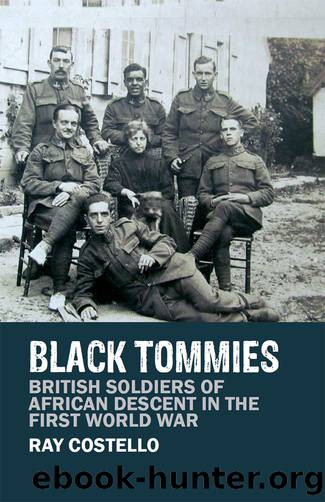Black Tommies by Costello Ray;

Author:Costello, Ray;
Language: eng
Format: epub
Publisher: Liverpool University Press
MEDICAL OFFICERS
A number of black medical practitioners resident in the United Kingdom, or who had returned to the West Indies, were graduates of British universities and applied to join the Royal Army Medical Corps (RAMC). This would have entitled them to a commission in the army as doctors, but they faced the problems encountered by other black applicants. The War Office and Colonial Office were keen to stress the futility of black men applying to join as medical officers, officially documented in May 1915, when the Colonial Office was told that only government medical officers from the West Indies of âpure European descentâ were likely to be accepted as officers in the RAMC.50
Dr Jenner Wright, Dr S.J. Allwood, Dr James Jackson Brown and Dr James Samuel Risien Russell
The British-born Dr Jenner Wright, the son of a prominent Sierra Leonean lawyer, was brought up in Britain by his mother. Newly qualified at the outbreak of the war, he joined his fellow doctors at the recruiting office to volunteer as a medical officer. His white contemporaries were accepted, but Wright was told to wait. After a time, he received a letter from the authorities telling him to go âhomeâ to Sierra Leone and seek employment there. He took this advice, and was forced to serve in West Africa with the inferior rank of âNative Medical Officerâ, an experience that left him a greatly embittered man. Similarly, Dr S.J. Allwood of Jamaica was told by the War Office in August 1915 that he should apply to the Commanding Officer of the Jamaica contingent for employment in his field. A particularly sad case was that of Dr James Jackson Brown, who had not only studied medicine at the London Hospital, but practiced in London. The only post he was offered in the RAMC was as a Warrant Officer, which he accepted, tired of arguing that his qualifications entitled him to a commission.51
It is worth remembering that by no means all officers and other military personnel served overseas during the First World War. Dr James Samuel Risien Russell (1863â1939) was yet another son of a white plantation manager and a black mother. His father, William Russell, had successfully run the Leonora sugar plantation in Demerara since the 1840s, presiding over the change from what he called âold time labourâ, meaning workers who had been freed slaves, to the newly indentured Indian and Chinese âcooliesâ, as he calls them in a letter to a British-based agent, perhaps a reflection of the racist linguistic norms of the time considering his marriage to a black, or at least mixed-race, woman. In the same letter, William Russell seemed to show an interest in the health and well-being of his charges (for very good reason in that post-slavery period), possibly providing the germ of medical interest picked up later by his young son.52 James and his brother William (born 1867) were sent to the Academy in Dollar, Scotland. Dr James Samuel Risien Russell studied at Edinburgh University from 1882 to
Download
This site does not store any files on its server. We only index and link to content provided by other sites. Please contact the content providers to delete copyright contents if any and email us, we'll remove relevant links or contents immediately.
The Radium Girls by Kate Moore(10922)
The Templars by Dan Jones(4197)
100 Deadly Skills by Clint Emerson(4089)
Rise and Kill First by Ronen Bergman(4026)
The Doomsday Machine by Daniel Ellsberg(3741)
The Rape of Nanking by Iris Chang(3529)
Killing England by Bill O'Reilly(3465)
Hitler in Los Angeles by Steven J. Ross(3449)
Stalin by Stephen Kotkin(3093)
12 Strong by Doug Stanton(3064)
Hitler's Monsters by Eric Kurlander(2740)
Darkest Hour by Anthony McCarten(2654)
Blood and Sand by Alex Von Tunzelmann(2614)
The Art of War Visualized by Jessica Hagy(2422)
Hitler's Flying Saucers: A Guide to German Flying Discs of the Second World War by Stevens Henry(2303)
The Code Book by Simon Singh(2222)
The Second World Wars by Victor Davis Hanson(2140)
Babylon's Ark by Lawrence Anthony(2077)
Tobruk by Peter Fitzsimons(2068)
